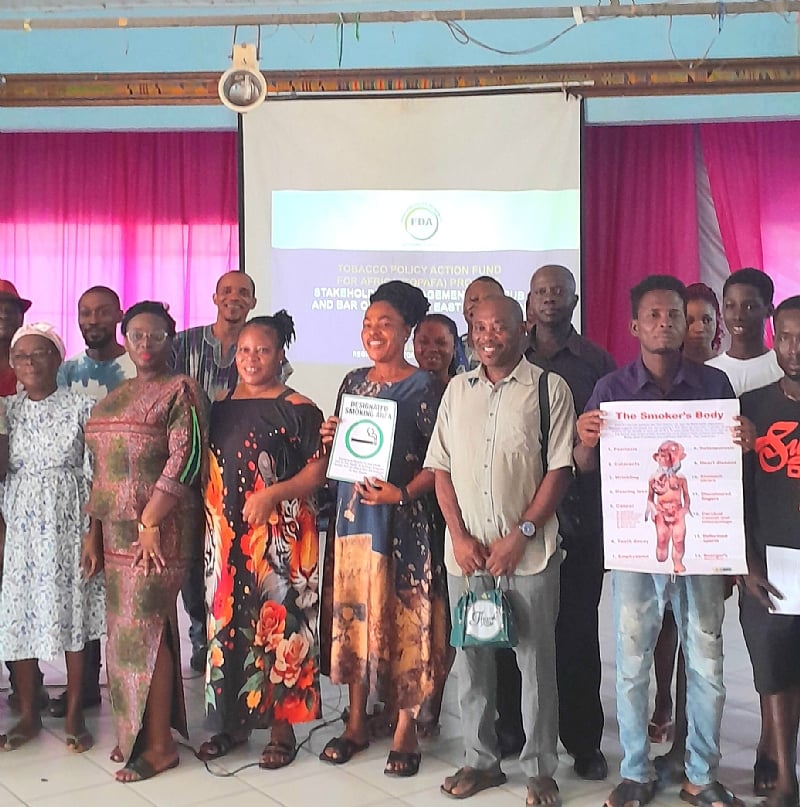The Food and Drugs Authority (FDA) of Ghana, under the auspices of the Tobacco Policy Action Fund for Africa (TOPAFA) project, convened a crucial stakeholder engagement in Koforidua, the Eastern Regional capital. The meeting targeted key players in the hospitality and entertainment sectors, including hotel management, bar owners, restaurant operators, food vendors, and other related service providers. The primary objective was to foster collaborative strategies to curb tobacco use and enforce existing tobacco control measures, aligning with Ghana’s commitment to the World Health Organization (WHO) Framework Convention on Tobacco Control. The TOPAFA project provides crucial support to sub-Saharan African governments in implementing effective tobacco control policies. This particular engagement signifies a proactive step towards mitigating the pervasive health risks associated with tobacco consumption in Ghana.
The one-day program attracted a diverse audience, including tobacco vendors and students, totaling approximately 34 participants. Ms. Anita Owusu Kuffour, the Eastern Regional Director of FDA, delivered a stark warning about the comprehensive health dangers of tobacco use, emphasizing its potential to damage the entire body. She expressed concern over the widespread lack of awareness regarding the severe health implications of tobacco products, advocating for stricter control measures to minimize these adverse effects. With the festive Christmas season approaching, Ms. Kuffour stressed the urgency of engaging bar operators in particular, given the increased social activity and potential for tobacco use during this period. The goal was to reinforce awareness of existing regulations and the detrimental health consequences associated with tobacco.
Central to the FDA’s mandate, as highlighted by Ms. Kuffour, is the enforcement of the smoking ban in public places. She underscored the legal framework provided by the Public Health Act of 2012, Act 851, Section 58, which explicitly prohibits smoking tobacco products in enclosed indoor areas of workplaces and public spaces, with the exception of designated smoking areas. This encompasses a wide range of public venues, including transportation terminals, markets, social gatherings, and entertainment venues, effectively emphasizing the comprehensive nature of the smoking ban. The FDA’s active monitoring and enforcement efforts were also emphasized, targeting vendors selling tobacco products without the mandated warning signs. Confiscation of such products and legal action against offending vendors serve as deterrents to non-compliance.
Ms. Kuffour reiterated the importance of adherence to tobacco sales guidelines within establishments. Businesses operating without designated smoking areas face potential closure, and allowing customers to smoke in prohibited areas exposes non-smokers to harmful secondhand smoke, further violating the law. The mandatory display of “No Smoking” notices in establishments was emphasized as a crucial measure to deter smoking, protect non-smokers, and avoid potential closure and legal repercussions from the FDA. This reinforces the shared responsibility of business owners in maintaining a smoke-free environment and protecting public health.
The stakeholder engagement proved impactful, as evidenced by participant feedback. Ms. Margaret Gbadago, one of the attendees, acknowledged her limited prior knowledge of the health risks associated with tobacco use, emphasizing the educational value of the program in reducing health risks, especially for those exposed to secondhand smoke. Mr. Yaw Amponsah Isaac, another participant, echoed this sentiment, highlighting the program’s benefits for both tobacco dealers and smokers in minimizing smoking-related health risks. He acknowledged the potential impact on businesses but emphasized the paramount importance of health over profit. Adherence to FDA guidelines was recognized as crucial for safeguarding the health and safety of non-smokers, reflecting a growing awareness and acceptance of tobacco control measures.
The gravity of the tobacco problem in Ghana is underscored by alarming statistics from the Tobacco Atlas. Over 6,700 Ghanaians succumb to tobacco-related diseases annually, with a significant 66% of these deaths occurring in individuals under 70 years of age. This data highlights the devastating impact of tobacco use on the Ghanaian population, particularly its premature mortality rate. The FDA’s stakeholder engagement, supported by the TOPAFA project, represents a critical intervention in combating this public health crisis. By engaging directly with businesses and community members, the FDA aims to strengthen enforcement of existing regulations, raise public awareness, and ultimately reduce the burden of tobacco-related diseases and deaths in Ghana. This proactive approach is essential for creating a healthier future for all Ghanaians.


